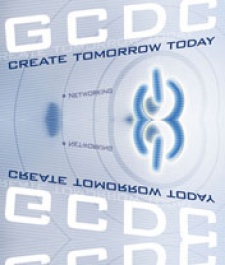It's been a tough couple of years for mobile developers.
Those who used to self-publish their games have been squeezed off the operator portals in favour of the large publishers, who work with a relatively small number of external developers (and in Gameloft's case, none).
Meanwhile, the medium-tier publishers who looked like providing a load of work for developers have been variable benefactors, with some pulling out of the market entirely, and others shifting to more internal development.
Plus, many UK developers were affected most by the collapse of aggregator Telcogames. And when there was work for indie developers, often it was pure work-for-hire projects giving them minimal chance to flex their creative muscles.
Like I said, it's been a tough old time for mobile developers. No wonder so many are packing their bags to go off and make DS games instead.
And yet this year's GCDC show (which turned into the full-on Games Convention on Wednesday) felt hugely positive on the developer side of things in a way it hasn't at such conferences for a while now.
The new-found positivity exists amongst a certain type of developer, though a new breed focusing on the higher end of mobile gaming, including iPhone, N-Gage and Symbian.
Well, I say 'new'. Fishlabs has been banging on about rich 3D games for several years now, and is finally seeing the market turn its way.
Distinctive Developments has been around forever in the UK, from the early days of Java. Meanwhile Aussie studio Firemint has built a business around developing big-brand games for the likes of EA and I-play, and used the proceeds to fund one of the standout mobile titles at this year's show, Real Racing.
And then there's the N-Gage lot: Nokia's army of first-party developers who've been pushing Nokia's gaming platform in all sorts of different ways: Ideaworks3D, Red Lynx, Jadestone, Digital Legends, Infinite Dreams
What all these companies have in common isn't just their creative ambition to make truly rich, 'mobile' games that truly stretch the platform. It's also the fact that they all see a chance for their big ideas to actually get to market.
This might be through deals with publishers who they say are actively seeking out innovation, through first-party development for N-Gage or embed deals with Sony Ericsson, or through self-publishing on Apple's App Store. Fishlabs is even using software pirates as a viral distribution platform for its latest game.
That's where the positivity comes from. Mobile developers have always had big, innovative ideas, but finally they think they can actually make them into games. Publishers are being credited, too: look how EA Mobile is working with several of the developers mentioned above.
There's a catch, of course. Plotting rich, boundary-pushing original IP games for iPhone or N-Gage is one thing, but the bulk of the market continues to reside in Java and BREW. You could argue that these less powerful platforms need these bright development minds even more they shouldn't be a ghetto where brands trump creativity and innovation.
But the thing I'll take away from GC 2008 is this: a bunch of developers showing and talking about genuinely exciting mobile games that in many cases aren't being done on other platforms.
It feels like mobile games are cool again not in an overhyped next-big-thing way, but in a 'Wow, I want to tell all my friends about this game and they won't laugh at me' manner.
The mobile games market isn't just about the iPhone, N-Gage and accelerometer-based smartphone games using hardware acceleration. In the scheme of actual sales, they're still a niche. But the excitement being drummed up by these games is good news for everybody.
After a run of shows where the mood veered between miserable and plain bitter, GCDC 2008 has been a true breath of fresh air.
GCDC 2008 Opinion: In praise of developers...
We're having a Ballmer moment





















